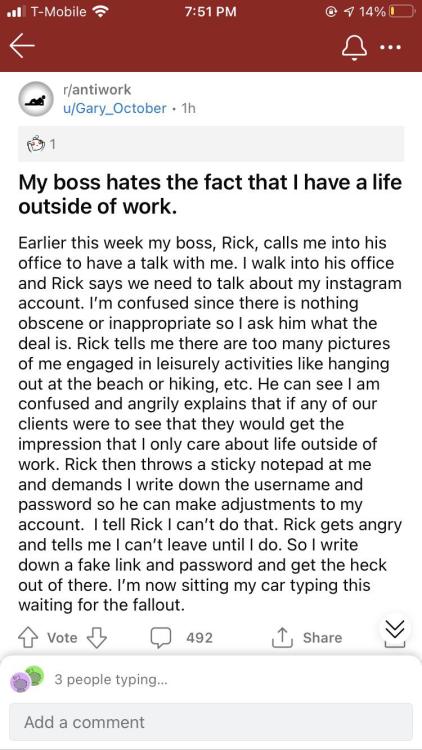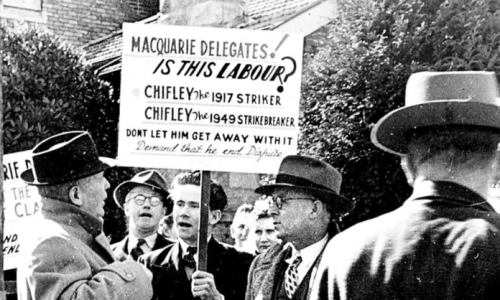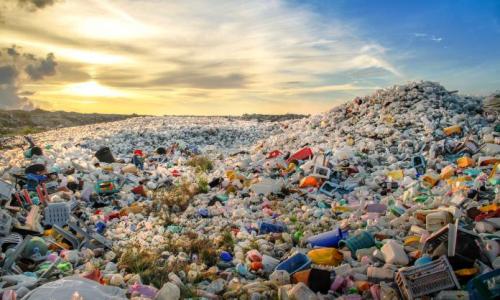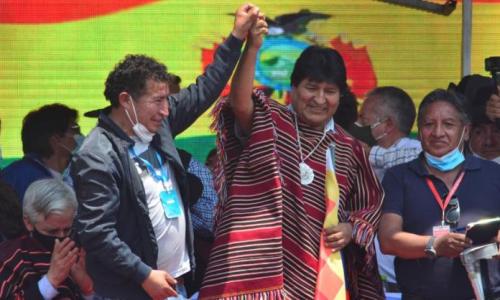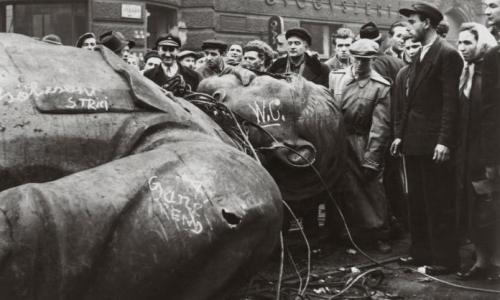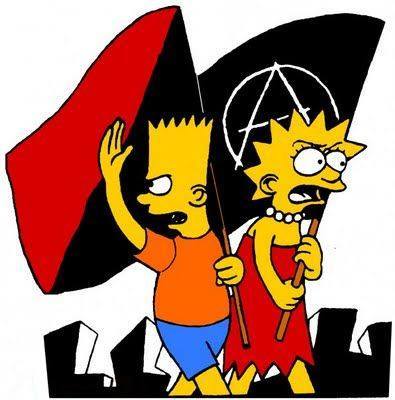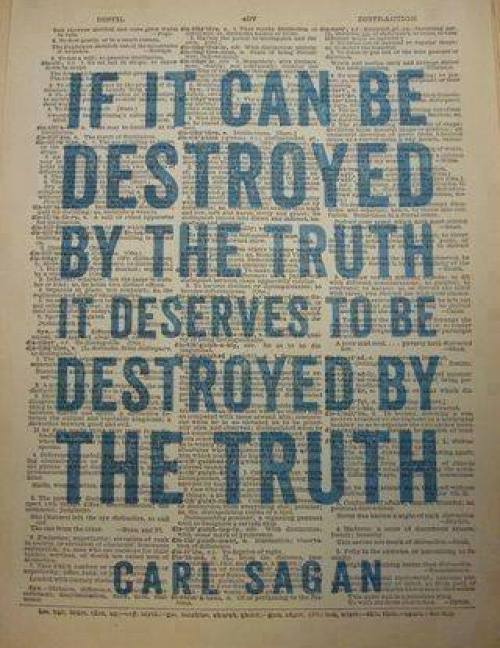#socialism
Issue 174 of Red Flag is out now
With 8 pages of analysis on the results of the US election, and the prospects for workers and the oppressed, both in the US and internationally, under Democratic Party rule. One thing we know: without resistance, nothing is going to change for the better.
Red Flag aims to play its role in fostering and giving voice to that resistance. Become a subscriber at subscribe.redflag.org.au, and help support a socialist voice in Australia’s right-wing media terrain.
Post link
“If the order is given to fire, don’t let me see any rifle pointed in the air; fire low and lay them out”, Lieutenant-Colonel Tom Price told his troops the day before confronting striking maritime workers in 1890. While no-one was shot, the action against workers continued a tradition of using troops to put down Indigenous and convict resistance and unrest in colonial Australia.
Fast forward to last month, when Prime Minister Scott Morrison refused to rule out the use of the armed forces on the wharves against workers who, he said, were “holding the country to ransom” with “straight-out extortion”. Striking workers in Australia have often been threatened with military force.
Troops were first used at the Lambton Colliery in the Hunter Valley in 1888, but their most notorious use was in the deep recession several years later, when the military was used against striking waterfront workers and shearers.
READ MORE: Using soldiers to smash strikes
Post link
Many scientists today agree we are living through a new geological epoch—the Anthropocene. It is an age defined by human activity, characterised by a reduction in biodiversity, an increase in the concentration of atmospheric carbon dioxide, the use of nuclear weapons, the impact of industrial processes and changes to the Earth’s surface as a result of mining, construction and erosion. One of the most disastrous features of this activity is the massive and increasing production of plastic, a material once synonymous with progress and innovation but which is now threatening the viability of the planet on which we all depend.
A glimpse at the world’s oceans reveals the dimensions of the problem. A 2017 study from the Ellen MacArthur Foundation found that by 2050, Earth’s oceans will contain more plastic than fish. Already, there are huge, submerged, moving concentrations of waste in every one of the planet’s oceans, known as garbage patches. The Great Pacific Garbage Patch, which lies between Japan and California, for example, is twice the size of Texas and continually growing. It acts like a vortex, pulling ever more rubbish into its centre.
READ MORE: Plastic capitalism is killing the planet
Post link
Almost a year after being overthrown in a right-wing coup, the Movimiento al Socialismo (Movement Toward Socialism, or MAS) emerged victorious in Bolivia’s presidential elections, held across the country last month. Despite hundreds of troops and police patrolling the streets on election day—and a campaign of intimidation and persecution that attempted to jail MAS presidential candidate, Luis “Lucho” Acre, along with dozens of other leading party officials—MAS won 55 percent of the vote, securing a two-thirds majority in the Chamber of Deputies of the Plurinational Legislative Assembly (ALP). The centre-right candidate, Carlos Mesa, and his Comunidad Ciudadana (Civic Community, or CC) received 29 percent of the vote. The fascist candidate, Luis Fernando Camacho, and his newly formed Creemos (“We Believe”) coalition, won 14 percent.
The result is a humiliating defeat for the pro-coup coalition: sections of the urban middle classes, large-scale agribusiness, cattle-ranchers, loggers and extractive capitalists of Bolivia’s eastern lowland departments, the police, armed forces, judiciary, fascist paramilitary gangs and their political representatives in Jeanine Áñez’s “interim” regime installed last November. And the result is a clear rejection of the coup-bloc’s pro-business and racist agenda by the country’s working-class and Indigenous majority.
READ MORE: Bolivia’s right wing has been defeated electorally. But they promise to strike again
Post link
On 30 July, Melbourne recorded 721 cases of coronavirus. The growing crisis pushed Premier Daniel Andrews into implementing a statewide lockdown that involved shutting down non-essential industries and curtailing a range of social activities. Now, as much of the world grapples with a second wave of the deadly virus, Melbourne has recorded zero daily cases for nearly two weeks.
Most Victorians are celebrating the easing of restrictions, pleased that their sacrifices have paid off. That they overwhelmingly abided by the restrictions reflects a strong sense of social solidarity, and countless lives have been saved as a result. So while it is true that the second wave was a product of the Andrews’ government’s neoliberal approach to managing the quarantine program, it must now be judged by its response to that wave. On the whole, the government has been overwhelmingly effective.
Despite this, Andrews has for months now been the target of vicious attacks. In the topsy-turvy world inhabited by the political class, the true calamity of 2020 is not the deadly virus that has killed more than a million people globally, but the measures that have successfully prevented that from happening here in Australia.
READ MORE: The evidence is in: lockdowns work
Post link
Red Flag isn’t afraid to call out politicians and CEOs who are letting our planet burn in the name of profit. We need radical action in the face of the climate emergency. Red Flag celebrates people fighting against climate destruction, tells the truth about what is happening in our oceans, and amplifies the voices of those bearing the brunt of climate change.
We were on the ground last year as protesters disrupted the International Mining and Resources Conference: a gathering of the top mining executives from around the world, backed by the Daniel Andrews Labor Government. We’re reporting now as people face court for daring to stand up to these climate vandals.
Subscribeto Red Flag to hear from environmental activists about the fight against climate destruction.
Post link
When the Hungarian revolution was only four days old, Peter Fryer arrived in Hegyeshalom, a small town on Hungary’s border with Austria. Fryer had been a writer for the British Communist Party’s Daily Worker for eight years; he had reported approvingly on the Hungarian regime’s show trials in the late 1940s. Now, in 1956, he was being sent to report on what his Communist Party described as a counterrevolutionary putsch aiming to overthrow a socialist government. Fryer wrote that on his arrival in Hungary, he thought he was setting foot in “a country where ‘we’ were in power. A country where a new life was being built, where the workers were in command”. He expected to see ordinary workers enthusiastically defending the government against a fascist insurrection. What he witnessed was the opposite.
A working class revolution was attempting to free the country from the shackles of national oppression which the Russian regime was imposing upon it. The revolutionary process was developing through the construction of workers’ councils, modelled on the soviets of the Russian revolution of 1917. “I saw for myself that the uprising was neither organised nor controlled by fascists or reactionaries”, he wrote in Hungarian Tragedy, the book he published while the revolution was being crushed by Russian tanks, and which became a classic account of a modern workers’ revolution. In Hungary, Fryer witnessed “a people’s revolution–a mass uprising against tyranny and poverty”.
READ MORE: Stalinism versus revolution: Hungary 1956
Post link
Since the horrific killing of Samuel Paty in Conflans, the French government has been trying to revive its fortunes with a drive for national unity. But behind calls to defend free speech, the government is launching an extraordinary offensive of Islamophobia and reaction. Now the national education minister has suggested that anyone who denounces Islamophobia should be seen as part of the camp of “Islamo-leftists”, guilty of intellectual complicity with terrorism.
The murder of Samuel Paty, a history teacher at Conflans Saint Honorine school, has aroused strong emotions. Teachers have complained for years that they feel isolated and exhausted; they were profoundly shocked by the event, which only seemed to reinforce those feelings.
In the country at large, widespread horror and shock have strengthened the government’s call for national unity.
Thus Emmanuel Macron spoke of the importance of “unity” against “those who cultivate hatred of the other”, of “Islamists that would steal our future”. The president made a very ideological speech at the Sorbonne, invoking the legacy of figures like Jaurès, Victor Hugo, and Louis Pasteur: “In France… the lights [of the Enlightenment] will never go out.”
READ MORE: Emmanuel Macron’s right-wing campaign against ‘Islamo-leftism’
Post link
We have been constantly told during the COVID-19 pandemic that we must follow the advice of the experts. As health experts are guided by what we believe to be objective data and science, many feel no need, or don’t feel confident to be critical of expert opinion. For the most part, this is a good thing. But what happens when different groups of experts have wildly divergent views?
Such is the case with expert advice on the best ways to deal with COVID-19 pandemic. In the early months of the pandemic, some health advisors—such as Sweden’s chief epidemiologist Anders Tegnell—championed herd immunity, while those in Australia and New Zealand advocated for widespread restrictions to suppress transmission. Individual health experts have, in addition, been inconsistent in their advice. Victoria’s Chief Health Officer, Brett Sutton, for example, has shifted his opinion around masks, the safety of schools and who should be tested on what sometimes feels like a weekly basis. Clearly, there is more to expert opinion than the objective truth, and we must consider the influence that capitalist ideology has in shaping the advice health experts are providing about COVID-19.
The Great Barrington Declaration is one of the most recent cases that has provoked major controversy among health experts. Authored by three professors in infectious disease and epidemiology from Harvard, Stanford and Oxford universities, the Declaration claims that lockdowns are devastating for public health and proposes an alternative “focused protection” strategy.
READ MORE: ‘The Great Barrington Declaration’: ideology and expertise under capitalism
Post link


